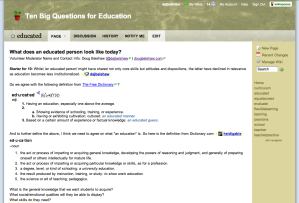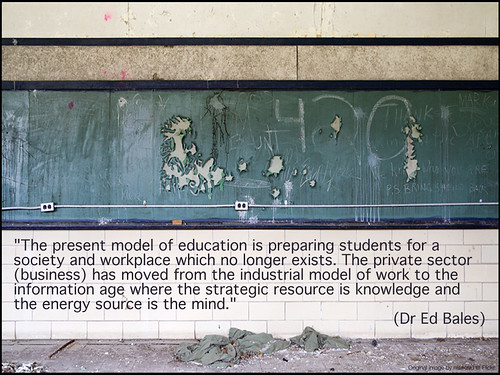Ten big questions for education
Hello! It’s been a good few years since I published this post. Sadly, the wiki that I linked to at the end of the post no longer exists, but the ten questions remain pertinent.
You may find some of these things useful, too:
- 5 ways to make ‘textbook lessons’ more interesting
- 10 things I learned from ‘Why Don’t Students Like School?’
- 5 things School of Rock can teach us about real education
Oh, and if you’re reading this as preparation for, or part of, your teacher training, good luck!
 I need your input and help. It’s for a good cause. I’m a firm believer that educational innovation is a bottom-up process. Could you help me (and others) prove that?
I need your input and help. It’s for a good cause. I’m a firm believer that educational innovation is a bottom-up process. Could you help me (and others) prove that?
I’ll try and keep this as brief as possible if you promise to do the background reading and try to contribute in some way. :-p
Introduction
EduCon 2.0 is both a conversation and a conference.
And it is not a technology conference. It is an education conference. It is, hopefully, an innovation conference where we can come together, both in person and virtually, to discuss the future of schools. Every session will be an opportunity to discuss and debate ideas — from the very practical to the big dreams.
This year’s was 29th-31st of January at the Science Leadership Academy, Philadelphia, USA (which is why I wasn’t there).
Background Reading
Will Richardson blogged about what happened at Educon and the next steps required to turn conversations into action:
- Continuing the Educon conversation
- The Big Questions: Now What?
- The Big Questions: Next Steps
- Time For Action: The Big Questions
Results
Will crowdsourced 10 questions that educators need to answer effectively:
- What is the purpose of school?
- What is the changing role of the teacher, and how do we support that new role?
- How do we help students discover their passions?
- What is the essential learning that schools impart to students?
- How do we adapt our curriculum to the technologies that kids are already using?
- What does an educated person look like today?
- How do we change policy to support more flexible time and place learning?
- What are the essential practices of teachers in a system where students are learning outside of school?
- How do we ensure those without privilege have equal access to quality education and opportunity?
- How do we evaluate and validate the informal, self-directed learning that happens outside of school?
Actions
 The next step was the creation of a wiki – 10fored.wikispaces.com. This is a place to continue the conversation and provide tangible results. Taking a step back but keeping an overview, Will has asked for volunteer moderators for each of the questions.
The next step was the creation of a wiki – 10fored.wikispaces.com. This is a place to continue the conversation and provide tangible results. Taking a step back but keeping an overview, Will has asked for volunteer moderators for each of the questions.
I volunteered for Question #6: What does an educated person look like today? I’m interested in how it relates to my thesis, the original title of which was ‘What does it mean to be ‘educated’ and ‘digitally literate’ in the 21st century’.
Help me out. Send a tweet to @dajbelshaw with the #10fored hashtag with some ideas. Or, better yet, add your thoughts to the wiki page!
Thanks in advance! 😀
(image CC BY CarbonNYC)



